
He was a very wrong Jew.
When the vast majority of his fellow tribesmen made the Revolution, he, a war-warrant officer, joined the newly created Volunteer Army and went with the whites to the famous “Ice Campaign” as part of the Ekaterinodar units of the “instant general” Pokrovsky.
When he broke through the defense of Yekaterinodar in March 1918, he was greatly shell-shocked, and this concussion until the end of his life reminded him of the White Guard past with a tremor of hands.
He never fought again.
After Civil, he acted a bit, and then went into journalism.
His name was Evgeny L. Schwartz.
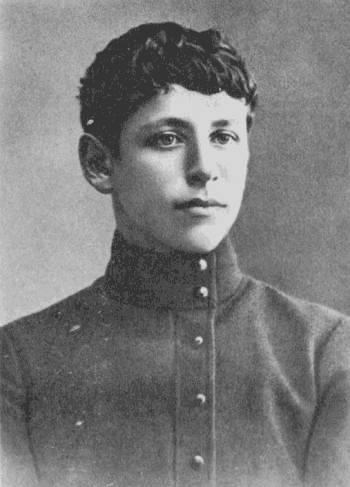
The second was a purebred Cossack - was born in the village of Kamenskaya, where his rich father was one of the most respected and respected stanitsa. Nikolai Chukovsky described him like this: “He was a Cossack, and, moreover, the most typical - blond, ruddy, curly, looking like Kuzma Prutkov, with a forelock created by God in order to stick out from under his cap with a cap . ”

He was a very wrong Cossack.
While the overwhelming majority of his stanitsniki sincerely despised the “naked proletarians”, he wholeheartedly believed in the Revolution, and, as in the song “left the house, went to fight”. Unlike Schwartz, who was immediately knocked out, this Civil one drank a full spoon.
“In December 1917 and in January 1918, speaking in arms against General Kaledin, he took an active part in the uprising against the Don counter-revolutionary government. In the ranks of the Red Guard, he fought against the Germans advancing on the Don, participated in the defeat of Denikin on the Don and the Kuban, ” he wrote in his autobiography.
But the point is not even in combat experience. The demons of the Civil War stormed over him completely.
Lydia Ginzburg adds details in her memoirs: “In the days of the advance of the Whites, he, hiding, got to his home. But his father personally gave him white as an apostate. He was beaten with ramrods half to death and thrown into the barn in order to shoot prisoners with a batch of prisoners in the morning. But he somehow crawled away and this time made his way to another village with his grandfather. Grandfather was softer and hid him . " Echoed by Nikolai Chukovsky: “Once he took off his shirt and showed me his strong, very white back, covered with a terrible interweaving of healed scars.”
The cannibalistic Civil War motto “son to father and brother to brother” he knew like no other. And the members of the commission for checking the non-working composition of the RCP (b) cell No. 9 at the editorial office of the Molot newspaper succinctly said: “During the Civil War, he killed his father because of political differences” .
His name was Nikolai Makarovich Oleinikov.

After the Civil War, he became interested in mathematics and journalism, worked in the newspaper Red Cossack. And in 1921 he was transferred to publish the newspaper of the Donetsk Provincial Executive Committee and the Provincial Committee with the chic title "All-Russian Stoker."
There they met - Oleinikov and Schwartz, releasing a literary supplement to the newspaper "Kochegarka", which the editor-in-chief wanted to call "Red Ilyich", but the youth convinced him to agree to the "Slaughter".
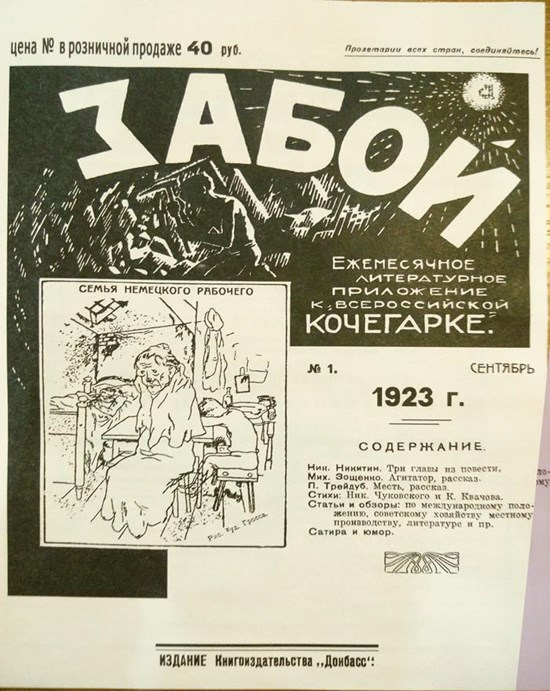
They made great friends - the former ideological “white” and the former passionate “red”.
I do not know why.
Maybe because neither one nor the other subsequently wrote a letter about the Civil War.
One way or another, they left for Petrograd from Donbass together. Together, they got a job in the Petrograd branch of Detgiz, to Marshak.
And Samuil Yakovlevich, appreciating the potential of this duet, soon instructed them to publish children's magazines - the famous Chizh and Hedgehog.
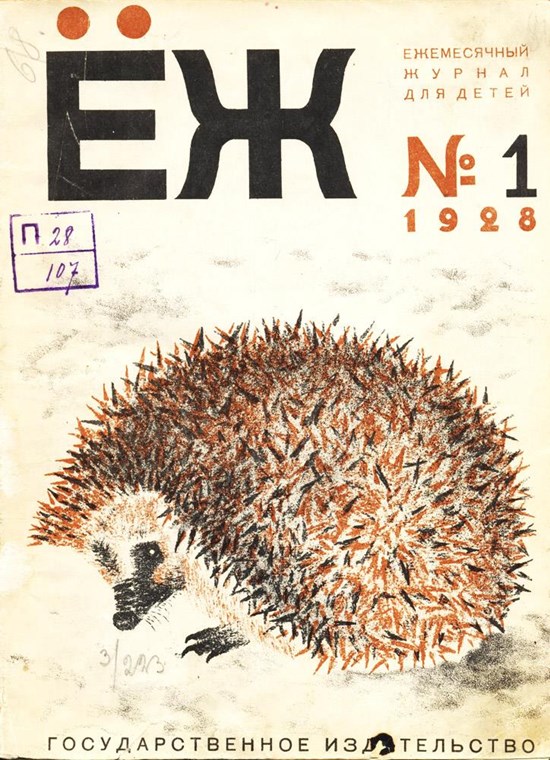
And then a miracle happened. It was there, in "Hedgehog" and "Chizhe", a company gathered that invented and created the format of Soviet children's magazines - with comic books, with sequels, with leading constant columns - products of crazy creativity, etc. That same great format, which was then replicated in its best years, and "Funny Pictures", and "Murzilka", and "Pioneer", and the Leningrad "Bonfire".
Those who wrote to the magazine were young — most were over twenty, they were going to live forever and write new great Russian literature between issues of the magazine.
Do you know how it happens? One day, Providence — either intentionally or accidentally — brings people who are high on doing something together. Not because of money, God forbid, and not because of a stupid career - but just their rushing. Pret and all. And you don’t even need vodka - you have enough of your own dope.
This is rare, but it happens. And if you are lucky - soak up what is happening with the whole body, because then you will remember this time all your life. Sometimes you will even get together and thump, alternating toasts with thunderous laughter, the dull sweetness of memories and the deathly longing for the understanding that you can’t enter this river anymore.
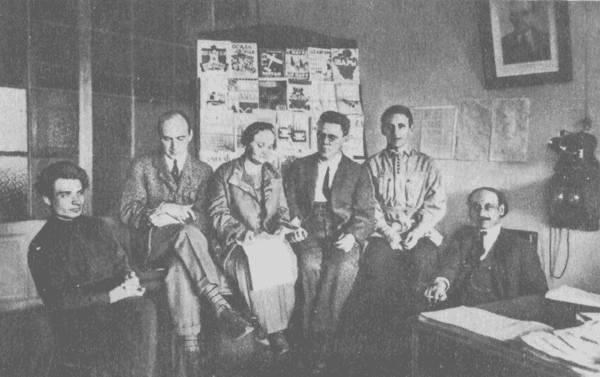
In the edition of children's literature of the Leningrad branch of the State Publishing House. From left to right: N. M. Oleinikov, V.V. Lebedev, Z. I. Lilina, S. Ya. Marshak, E. L. Schwartz, B. S. Zhitkov. The end of the 20s.
Here is how the same editorial staff described the same Nikolai Chukovsky:
That was the childhood era of children's literature, and her childhood was fun. The children's department was located on the fifth floor of the State Publishing House, and this entire fifth floor shook from laughter every day during all office hours. Some visitors to the Children's Department were so weakened with laughter that, having finished their affairs, they went out onto the landing, holding hands against the walls, as if they were drunk. Jokers need a suitable audience, while Schwartz and Oleinikov had an excellent audience. A young, thin student named Irakliy Andronikov was sent to the Children's Department as a trainee. The trainee did not write any poems, even comic ones, but he was not inferior to Schwartz and Oleinikov with the ability to joke and perceive jokes. Every day poets came to the Children's Department - Vvedensky, Harms, Zabolotsky - young, funny people who dreamed of a grotesque transformation of the world, which upset them with its boring routine.
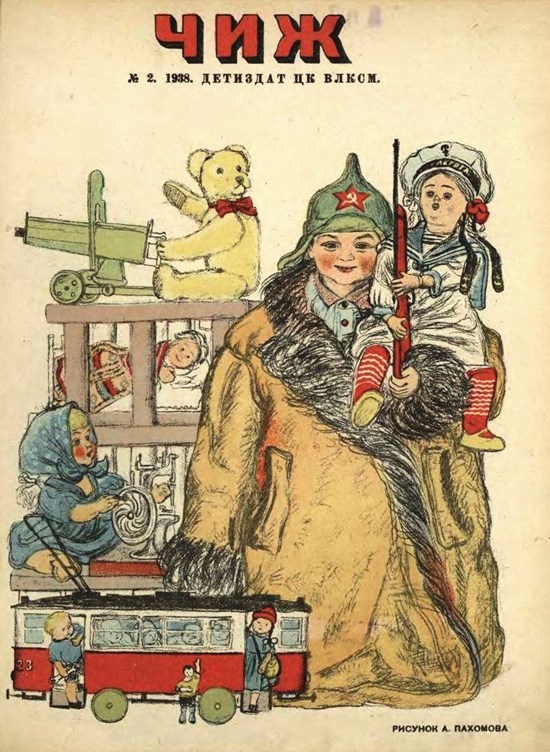
But here is how the famous children's writer Leonid Panteleev recalls his acquaintance with the Children's Editorial Board:
And on the appointed day, Grisha Belykh and I, young authors of the recently completed story “Republic of Shkid”, timidly climb to the sixth floor of Singer’s former house and suddenly we see: they stomp on us cheerfully - on all fours! - two adult uncles. One is lush-haired, curly-haired, the other is thin-faced, beautiful, with hair smoothly combed on a side parting.
A little dumbfounded, we are pressed against the wall to let this strange pair pass, but the four-legs also stop.
“Do you want anything, boys?” - curls to us.
“Marshak ... Oleinikov ... Schwartz,” we babble.
- Very nice ... Oleinikov! - Recommended lush-haired, raising the right front paw for a handshake.
- Schwartz! - his friend holds out his hand.
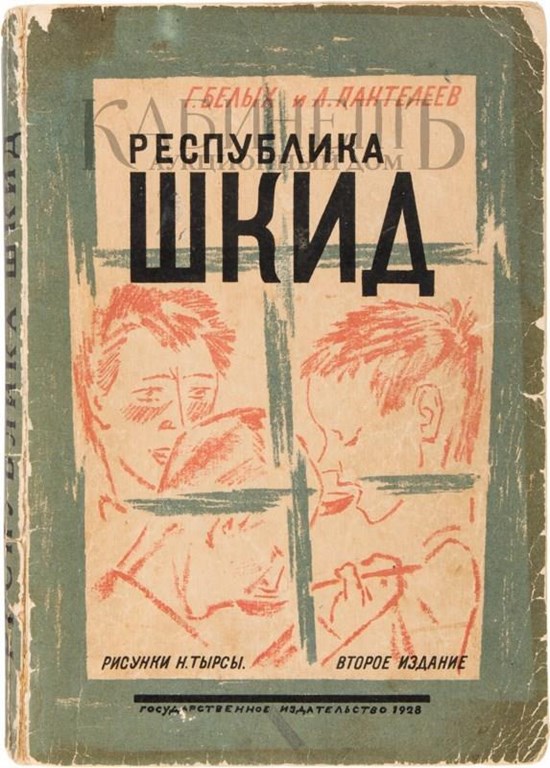
This whole fairy tale ended as usually similar tales end.
The miracle of unity from a certain moment suddenly began to cringe, and mutual irritation, on the contrary, increased. Some silly nit-picking, mutual pretensions began, and - as yet small - stones in the bosom.
Then the old wise Marshak, who had sensed before everyone that the rigorous fraternal twenties were being replaced by strict particulars of the thirties, slowly, one by one, fired everyone.
And after that everyone quarreled. Even Schwartz with Oleinikov, although “for many years in our literary circles“ Schwartz and Oleinikov ”sounded like“ Orestes and Pilad ”,“ Romulus and Remus ”or“ Ilf and Petrov ”” .
Chuyka did not fail the old editor, translator and Zionist - almost none of this company slipped through the 30s.

Kiril Bozhinov. Daniil Kharms & The Oberiu Group. 2014
In December 1931 - the first arrest of Kharms and Vvedensky (they will close Andronnikov with them, but will be released in a few months), the second time - and forever - they will be taken away in 1941. In March 1938, Zabolotsky, a boring accountant outside and the great Russian poet inside, will be arrested.
And in July 1937 they will take away and in November they will shoot Nikolai Oleinikov. Arriving in the early Moscow train, Irakliy Andronnikov will meet him at the entrance, and, not paying attention to the convoy, will bewilderedly ask: “Kolya, where are you going so early?”
“Nikolai Makarovich looked around. Grinned. And that’s all! ”
Schwartz, the only survivor, will write in his memoirs his best obituary:
Once Harms, Oleinikov and Zabolotsky came to us. Let's go wander. We lay down under some kind of oak. We were all upset by the total lack of money. It would be nice to drink, but there was no money clean. Then Harms, lying on the grass, read a poem at my request: "God woke up, He opened his eyes, He took a grain of sand, Threw it at us." For a while it became easier, the mess was not bad, not good weather, bald neighborhoods entered a semblance of correctness. And without vodka. But it soon dissipated.
We talked sluggishly about literature. And they began to discuss (when the semblance of correctness finally disappeared) where to get money. I was in debt with Kaverin. And none of the guests wanted to ask. They were shy.
Soon, behind the glass of the terrace, Kaverin appeared. He was delighted with the guests. He respected them (especially Zabolotsky, whom poetry knew better than others) as interesting writers seeking a new form, like Kaverin himself. But they were not looking for a new form. They could not write otherwise than they write. They had an aversion to everything that became literature. They were geniuses, as they themselves said, jokingly. And not really joking.
In any case, it was near them that I realized that genius is not a degree of giftedness, or not only a degree of giftedness, but a special warehouse of the whole being. For them, my worst friends of those years, there simply did not exist those laws that Kaverin firmly believed in. They knew these laws, understood them much more organically than he did - and that is precisely why, at least in their truthfulness, they could not accept. Their fate is in most cases tragic. And near the straight-straight paved Venus path, it was strange to look at them. I don’t remember if they gave us vodka or not . "
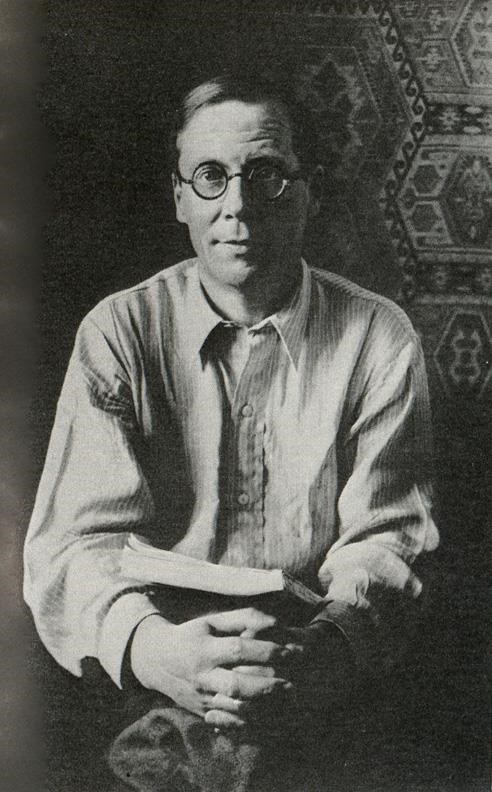
Nikolay Zabolotsky
And Zabolotsky, the only one who returned from there years later, in 1952, dropped on his paper “Farewell to friends”.
In wide hats, long jackets,
With notebooks of his poems,
Once upon a time you crumbled to dust
Like branches flying over lilacs.
You are in that country where there are no ready-made forms,
Where everything is broken, mixed, broken
Where instead of the sky there is only a grave hill
And the lunar orbit is motionless.
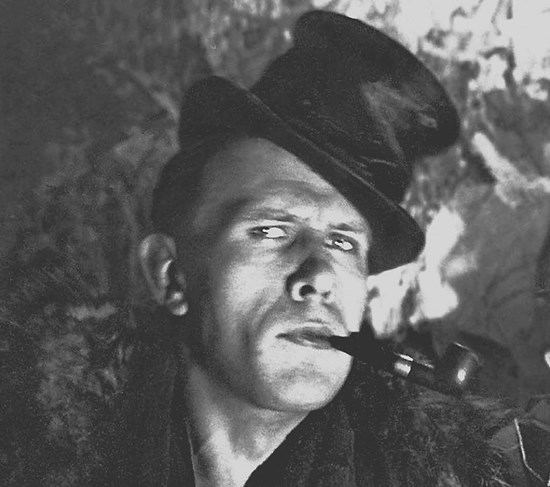
Daniel Harms
There in a different, slurred language
Sings the synclite of silent insects
There with a small flashlight in hand
Beetle man greets friends.
Are you calm, my comrades?
Is it easy for you? And have you forgotten everything?
Now you have brothers - roots, ants,
Blades of grass, sighs, columns of dust.
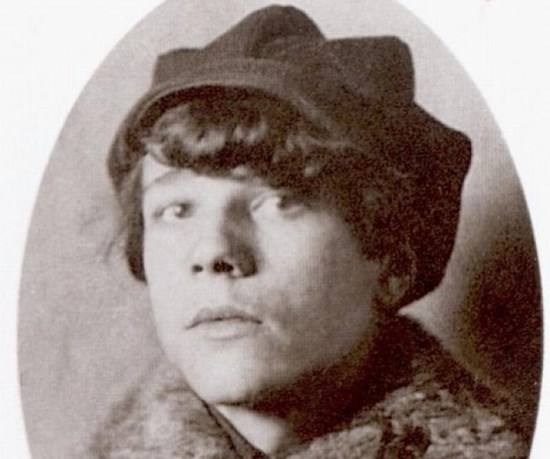
Alexander Vvedensky
Now you have sisters - flowers of carnations,
Lilac nipples, slivers, chickens ...
And I’m not able to remember your language
Upstairs left brother there.
He has no place in those parts
Where you disappeared, light as shadows
In wide hats, long jackets,
With notebooks of his poems.

Nikolay Oleinikov
And in a good way, you need to end the text on these ingenious lines - it turned out so long.
But no.
As Schwarz wrote in Ordinary Miracle, " there is greatness in the tragic ends - they make the survivors think . "
For many years, the mystery of Oleinikov haunted me. Everyone in this company left an invaluable literary legacy. Even Schwartz, who found himself very late, did the impossible in the second half of his life - he wrote with a dozen brilliant plays and several great fairy tales.
And almost nothing remained of Oleinikov. So, a handful of poems, of which half are banter about insects like “beetle-bourgeois and beetle-worker perish in the class struggle”, and the second half are mocking declarations of love to various young ladies, often on the verge of obscenity. Well, yes, he was probably an excellent editor - after all, it was Oleinikov who, from the 10th issue, was the chief editor of Ezh and Chizh. But, you forgive me, when we even remembered the ingenious editors, and are there such people?
Moreover, everything is everything! - memoirists who knew him personally speak of the incredible scale of personality and the overwhelming power of creative talent.
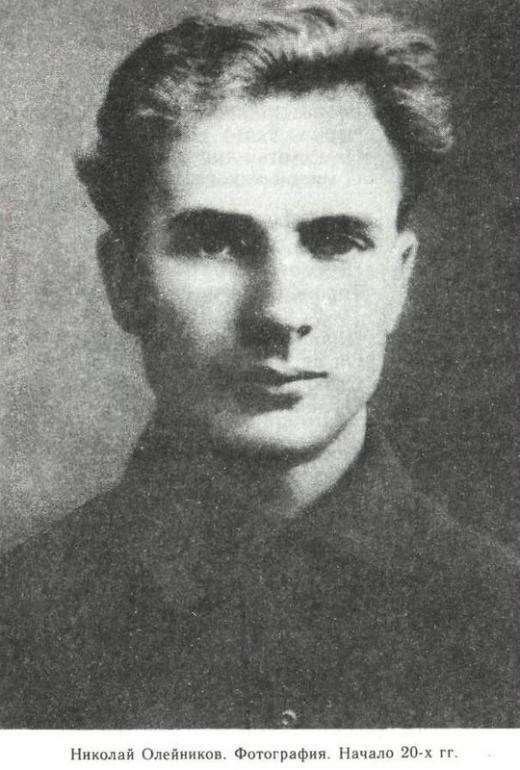
The same Leonid Panteleev wrote: “Anyone who knew Oleinikov only as a very peculiar poet, an excellent journal editor, pun and wit, he is unlikely to understand what is behind this <...> There was something demonic in Oleinikov. I use this unfashionable word because I could not find another. ”
Cautious Schwartz, extremely restrained in his assessments and very ill-disposed towards Oleinikov in the 30s, calling him “my friend and worst enemy and detractor,” wrote the following about him:
“He was smart, strong, and most importantly - passionate. With passion, he loved business, friends, women, and - by the fateful nature of passion - he sobered up and hated as much as he had just loved. And he blamed his sobriety for the affair, the friend, the woman. It’s not enough to say - he accused him: ruthlessly and obscenely mocked them. And he was in a state of sobriety much longer than in a state of love or delight. And therefore he was a mighty destroyer. And in his passion and sobriety, he was contagious. And he didn’t forgive anything. <...> He was unusually gifted. Brilliant, if you speak boldly. "
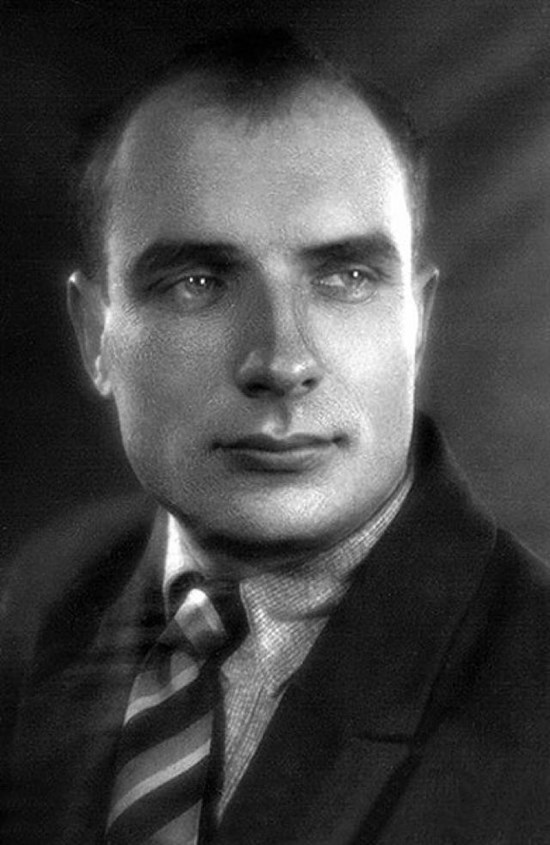
And I still could not understand - but where, where is this genius? Why is it nowhere to be seen?
And then, when I re-read Nikolai Chukovsky, “Oleinikov still wrote only homemade comic verses and made no attempt to become a professional writer. As if to emphasize the comic nature and insignificance of his works, he usually did not make people, but insects, as their heroes ” - it dawned on me.
Yes, he hid her! Stupidly did not want to implement. Did not want. He resolutely thwarted all attempts to beg him to write something serious, to do something more than signatures for comics or writing riddles for preschoolers.
Harms has a conceived, but never written "story about a miracle worker who lives in our time and does not work miracles. He knows that he is a miracle worker and can perform any miracle, but he does not . ”
When I learned that, in the opinion of many literary scholars, Harms had in mind Oleinikov, I was no longer very surprised.
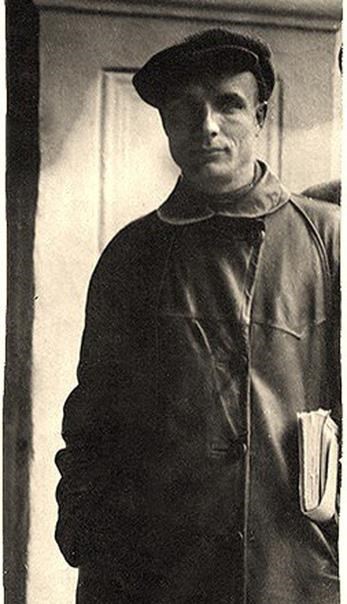
***
When Oleinikov was arrested, according to the custom of those times, at the very first meeting of the board, they arranged an analysis of Schwarz's personal case. As the playwright himself wrote: “I had to answer for my relations with the enemy of the people. The only thing I said: “Oleinikov was a secretive person. The fact that he turned out to be an enemy of the people is a complete surprise to me. ” After that they asked me how I became friends with him. Where. And so on. <...> I stood at the skinny columns of the Rococo living room, disgusted and horrified, but feeling that I could not oppose Oleinikov, even die . "
He managed to talk about Oleinikov only twenty years later, in his best play. The one where the Wizard, if you think about it, is not at all one of those that arrive in a blue helicopter.
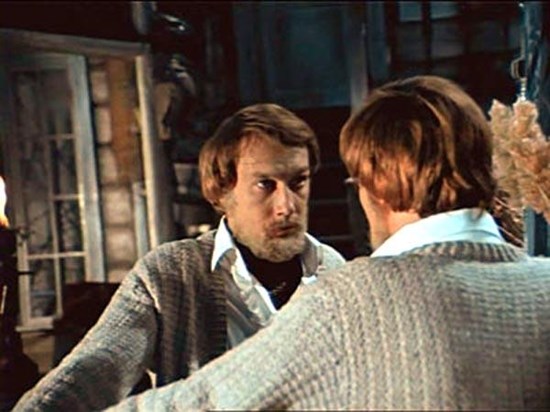
He is not at all kind. This is because he arranged everything, and solely on a whim. For him, we humans are nothing more than fun. The deck of cards, which he shuffled and revived, "and they all began to live so that you would laugh and cry."
That's right, if wizards exist, then they almost certainly are. Yes, the strength of Schwartz’s plays lies precisely in the fact that he didn’t hide the readers from the truth, but still ... Still ...
Remember the finale of this famous monologue?
Sleep, my dear, and let yourself. I, in my misfortune, am immortal. I have to outlive you and yearn forever.
Glory to the brave men who dare to love, knowing that all this will come to an end. Glory to the madmen who live for themselves as if they are immortal - death sometimes departs from them.
Disclaimer: To the inevitable question of “What does this have to do with IT?” No, I agree. But a rather popular hub “Biographies of geeks” exists on Habré, and it is deciphered as follows: “Life stories of wonderful people.”
I’ve been a sinful affair and thought - why not? Suddenly, IT and history are not “two things incompatible” at all?